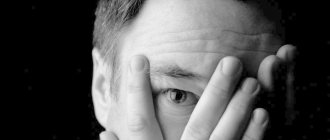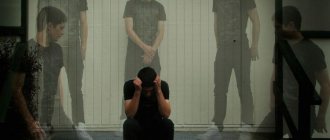May 31, 2022
During the day, a person is bombarded with an avalanche of various sounds: quiet and loud, the singing of birds and the knocking of the neighbors' bumper, the hum of the subway and the sound of the wind. The noise of pipes, the hum of a computer, the sound of cars, the sounds of neighbors, a TV, a refrigerator, a washing machine, the noise of a crowd. A person often gets used to background sounds and does not notice them.
Sounds play an important role in human life. They can save someone's life. By knocking, screaming, and squealing, people reported mortal danger. They could do this with a whistle, a weapon, a car horn, or just shout. But it is difficult to imagine that someone who hears such a signal sound can fall into a state of wild fear and panic.
Fear and panic attack from hearing a loud sound is acoustic phobia.
What is phonophobia?
Phonophobia is a (neurotic) anxiety disorder that is part of a group of specific phobias characterized by a fear of loud sounds. In extreme cases, it takes the form of fear of one's own voice. The term phonophobia comes from the Greek words phn, phnma, which mean sound, voice, and phobos, which translates to fear.
It is also called ligyrophobia or acousticophobia. A feeling of anxiety can appear not only as a result of the direct action of the anxiety factor, but also sometimes as a result of its image. For example, the sight of a person inflating a balloon to a size at which it might burst creates an alarming situation, since patients can anticipate the noise that may accompany it.
Causes of development in adults and children
Fear of loud sounds is logical and natural for humans.
After all, a loud sound is a sign of danger. Shouts: “Fire!”, “Help!”, “Guard”, an ambulance siren or the sounds of a police car siren - all this was not invented in vain, has been tested over the years, has helped many people out many times, saved many lives. But how does a rational mechanism of society become a disease, a painful illness that prevents one from fully existing in this same society? The causes of acoustic phobia may be psychological , associated with certain negative experiences in childhood.
Loud sounds often accompany aggression from adults in the family, as well as quarrels, scandals and disputes. Therefore, it is not surprising that a child who systematically witnesses unhealthy relationships between adults, on whom he directly depends and cannot rid himself of them and protect himself from them, suffers and can experience the consequences of this for many years.
This situation can also cause the development of acoustic phobia. Before the traumatic event occurred, the person heard a loud sound. The psyche connects these two events, links them into a single whole, and subsequently reveals that a loud sound is the cause and an indispensable component of any alarming or terrible events in life.
Acoustic phobia can also be caused by physiological reasons.:
- traumatic brain injuries;
- consequences of infectious diseases;
- consequences of surgical operations;
- pathology of the central nervous system;
- prolonged stress;
- pathology of the hearing organs and more.
However, it should be noted that in the vast majority of cases, the cause of acoustic phobia is still psychological, not physiological.
Children are more susceptible to acoustic phobia than others. However, if a phobia has formed and has not been cured, then in adulthood a person experiences its symptoms much more intensely and severely.
What causes phonophobia?
Various factors may be responsible for the development of this disorder. The researchers emphasize in particular the role of otolaryngological diseases that the patient has had or is experiencing, including, for example, increased hearing sensitivity associated with tinnitus or acoustic trauma due to exposure to loud sounds.
On the other hand, phonophobia can be caused by environmental or genetic factors.
Its determinant, as in the case of other simple phobias, may be a traumatic event accompanied by a loud noise - therefore, the phobia coexists with post-traumatic stress disorder (PTSD). An overly activated limbic system, which is responsible for emotions, predisposes to the disease.
Prevention of development
As preventive methods for the development of acoustic phobia, the following rules should be followed :
- Children should grow up in a favorable, comfortable psychological atmosphere. Scandals, quarrels and screams affect the psyche not only of the adults themselves who initiate them, but also the child’s psyche.
- Both children and adults must maintain a sleep-wake schedule. A healthy 8-hour sleep is the key to a healthy body and a preventive measure for the development of any ailments.
- You should not start the progression of diseases associated with the ears. It is definitely worth treating them, and under the supervision and guidance of professionals.
- A hat is an indispensable attribute of the wardrobe during the cold season. It is also a means of preventing hearing diseases.
- You should build a life routine so that stress has no place in it.
- Avoiding hazardous industries, in particular noisy workshops, is also a way to protect your health from the development of diseases and acoustic phobia, in particular.
Symptoms
Phonophobia manifests itself in a variety of psychosomatic diseases. In response to an active anxiety stimulus, the patient reacts with extremely strong, irrational, involuntary fear. He loses control over his behavior. He becomes aggressive, distracted, irritable, agitated and panicky. May be accompanied by physical symptoms - headache and dizziness, shortness of breath, increased blood pressure, muscle tension, abdominal pain, nausea. Phonophobics avoid places and situations in which there is a risk of a phobic factor.
Diagnostics
A doctor can diagnose phonophobia in a patient during a conversation when he finds confirmation in the patient’s answers that he has clinical symptoms of this phobia.
Psychological tests can also be used as an additional diagnostic tool. These two diagnostic methods give an accurate answer as to whether the patient has this phobia.
What could be the consequences?
In extreme cases, phonophobia can lead to misophonia, a hypersensitivity to sound. The term comes from the Greek words misos - “to hate” and phone - “sound”. The phobia is characterized by a sharply negative emotional reaction in response to certain sounds, for example, creaking doors, ticking clocks, footsteps, typing, loud breathing, slapping, squelching, sniffling, children crying, etc.
Disgust usually concerns sounds made by those closest to you. This condition was first described in 2000. An inadequate way to cope with this condition is the avoidance technique - using earplugs, listening to music through headphones to cut yourself off from unpleasant sounds.
This method can weaken social bonds and isolate and even increase the number of sounds that the patient cannot tolerate. Techniques used in tinnitus treatment and psychotherapy can improve quality of life in misophonia. Habituation therapy, also known as TRT training (Tinnitus Retraining Therapy), has shown good results. It consists in suppressing conditioned reflexes. It seeks to evoke pleasant associations with sounds that the patient finds unpleasant.
Manifestation of acoustic phobia:
Residents of megacities have an extremely difficult time; man-made sounds haunt them at every step.
People suffering from acoustic phobia are afraid of : a creaking door, a bursting balloon, a switched-on household appliance, the sound of firecrackers causing panic, toys making loud sounds, songs performed in a ringing voice, music, the sound of air and ground transport, thunderstorms, croaking birds.
They have poor control over their behavior, feel weakness in the limbs, and possibly increased heart rate. They prefer not to attend mass celebrations and avoid fireworks and fireworks. Even at home, they behave somewhat carefully: the sound adjustment of household appliances is carried out exclusively from the lowest positions.
- the patient is afraid of children and dogs, as they can make unexpected loud noises,
- do not attend parties, movies, holidays,
- don't go out
- is wary of speakers, microphones, horns,
- When you turn on the TV, a person immediately reduces the sound level to zero, then gradually increases it
- anxiety when talking on the phone,
- the traffic noise is unpleasant,
- irritation from neighbors' conversations,
- use of earplugs,
- long sound causes tension,
- a feeling of discomfort in a conversation in a raised voice and quarrels.
- avoiding situations that can cause panic attacks.
- Aggression in response to loud sounds is possible.
As soon as the annoying noise subsides, the person’s emotional state returns to normal. Convulsions may occur.
How is phonophobia treated?
Phonophobia, like other simple phobias, requires the help of a specialist - a psychologist, psychiatrist or therapist. In treatment, in addition to psychoanalysis, which examines the source of the disorder, cognitive behavioral therapy is used, which serves to change negative, incorrect emotions and thoughts associated with sounds into constructive and favorable ones.
Most often, gradual desensitization of phonophobes occurs. The first step of so-called desensitization is the development of a hierarchy of phobic situations. Then an alarming situation is artificially caused - initially of low intensity. Through concomitant desensitization, relaxation techniques reduce the intensity of anxiety to a phobic level. Relaxation techniques include breathing exercises, muscle relaxation, music therapy, yoga, meditation, etc. In more severe cases, drug therapy with anxiolytics may be required.
What treatment methods are used?
To treat phonophobia, drug therapy is used , which is prescribed for the treatment of anxiety disorders.
In addition to medications, the patient must attend psychotherapy. The result will be better and achieved faster if you combine these two treatment methods.
It is also possible to prescribe hypnotherapy and NLP techniques as additional methods of treating phobias.
Causes of phobia
- An unexpected loud sound that frightened a person in early childhood. If, after a sudden knock or clap, the child cried a lot and could not calm down for a long time, this means that the baby experienced a strong emotional shock. The child may not be prepared for the sharp sound of turning on a household appliance, the ringing of an alarm clock or the ringing of a telephone. Misunderstanding of the nature of the sound stimulus aggravates the baby's fear.
- A loud sound preceded or accompanied some tragic event. This could be an explosion during a terrorist attack, the sound of colliding cars, people screaming, explosions and gunshots in a war zone.
- A natural disaster or natural phenomenon accompanied by loud noise.
- A sound technique used in horror films. Initially, the plot unfolds in such a way that a person freezes and is in strong emotional tension, then frightening actions occur against the background of a sharp loud sound.
- Chronic stress and suspiciousness increase the likelihood of developing a phobia.
Treatment of fears: when to contact a specialist
If you have a full-fledged neurosis, in order to stop anxiety states, you will also need to work with the background.
That is, it is important to optimize your relationships with yourself, with people, and your lifestyle, in order to eliminate the mechanisms that generate your body and psyche being in a state of chronic stress. Otherwise, fears will continue to catch up with you. Imagine a pot of water on a burner that is turned on. To stop the water from boiling, you need to turn off the gas. Otherwise, you will have to endlessly add cold water (do relaxation exercises, meditate, convince yourself that everything is fine and nothing bad will happen, take sedatives...) and open the lid slightly (do physical exercise) to let off the steam.
From the point of view of psychotherapy, this is the most intellectually interesting part of the work for a psychotherapist, because people are all different, their situations are different, and there is a huge field for creativity. It would probably be better for people if everything was standard. Then, with the help of algorithms from specialists, they would be able to independently cope with their fears and anxious experiences.
Drug treatment for neuroses is justified if anxiety states significantly interfere with normal (as before neurosis) functioning.
Mostly drugs are used that remove fear/anxiety at the moment of their appearance, that is, to relieve them. These are tranquilizers (Relanium, phenazepam, Xanax, Atarax) or much weaker drugs (Corvalol, Novopassit, Afobazole, Persen). We rarely prescribe the latter due to their low effectiveness in cases of panic. But for mild anxiety states they may be quite appropriate.
The second group, which is used in the treatment of fears, is antidepressants. They reduce anxiety, stabilize the autonomic nervous system and thereby reduce the likelihood of severe attacks. Unfortunately, medications can only reduce symptoms, nothing more. But, sometimes, this is also very necessary in order to quickly bring a person “into service.”
Anxiety and fear among people? Treatment can be supplemented with the following recommendations:
- Exercise at least 3 times a week for 45 minutes. Physical activity helps relieve background stress.
- Optimize your work and rest schedule.
- Don't drink alcohol or at least reduce the amount. Everyone knows how, after alcoholism, a state of panic can set in in the morning.
- Try to reduce the amount of stress in your life.
You can get rid of neurosis and start living as before. One patient once said: she used to think that she wouldn’t wish an enemy to go through what she went through. But now I’m even glad that I was able to cope with neurosis, since her life has become much better and more fulfilling. I don’t think that neurosis is given to a person for something or for something, but it can definitely be used to optimize your life. Although, of course, it would be better not to exist.
Loud sound - a helper to a person in trouble
The ability to listen to loud sounds and the ability to produce them can save a person's life. There are many cases where people managed to communicate their difficult, life-threatening situation by knocking. To attract attention, you can use a car horn, a whistle, a firearm and any other devices and objects that can make loud sounds.
Ideally, a person in trouble can play an international SOS distress signal. To do this, you must first make three short sounds in a row, then make three long sounds and again repeat three short sounds in a row. After 1 minute of silence, you need to do the same again. Rescuers will definitely recognize such a signal as a call for help.
Prevention of phobias and fears
In order to prevent phobias, many techniques have been created that allow a person to cope with their condition, moderate the severity of negative symptoms and achieve emotional balance. During psychotherapy courses, such techniques are taught in detail; a person becomes more resistant to stressful situations and can resist his obsessive fears. Additionally, for prevention, experts advise:
- Minimize the consumption of caffeinated drinks (this is due to the fact that caffeine increases feelings of anxiety);
- engage in moderate sports (for example, swimming or yoga);
- do not use psychotropic and narcotic substances;
- Go to group and individual meetings with a psychologist in a timely manner.
Fear of the sound of voices
Fear of the sound of voices is a severe type of acoustic phobia . The cause of a complex disorder must be sought in the childhood of the sick person. Fear of speech is a consequence of constant insults and humiliation. If a person is accustomed to hearing only negative words addressed to him, a fear of hearing any speech at all gradually develops. Another reason is frequent quarrels between parents.
If one of the family members showed aggression towards members of the household, and the child had to hide and remain silent so as not to provoke anger towards himself, then the consequence may be fear of his own voice. With this disorder, a person is able to calmly formulate a thought in his head, but when trying to voice it, he gets confused or forgets the words.











